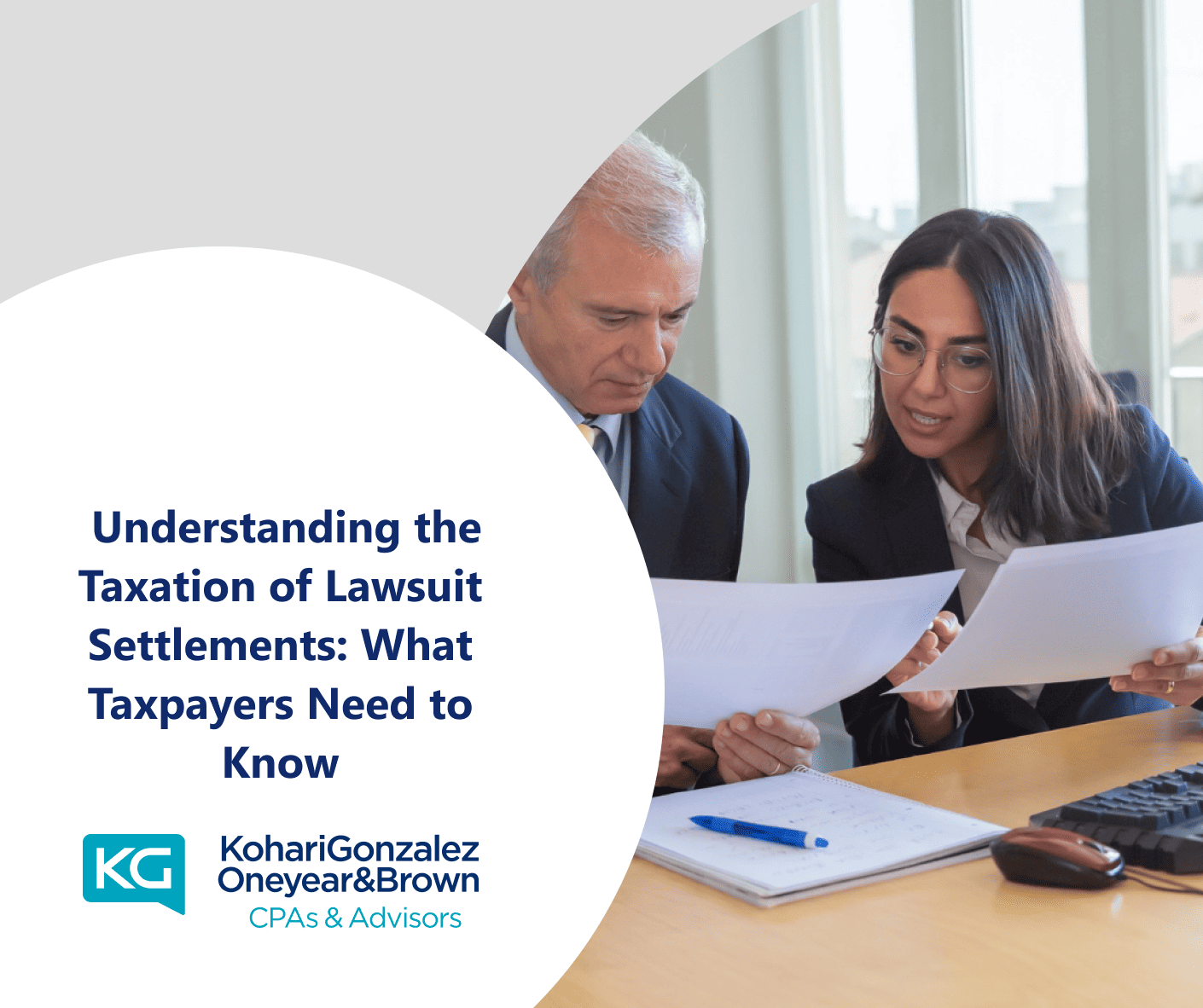
Article Highlights:
- Tax Treatment of Settlement Proceedso Personal Physical Injuries or Physical Sickness
o Emotional Distress or Mental Anguish
o Lost Wages or Lost Profits
o Punitive Damages
o Business Damages
o Interest and Property Settlements- Deductibility of Attorney Fees and Its Impact
o General Rule on Deductibility
o Impact of Fees on Settlement Proceeds
o Exceptions
o Business Settlements- Strategic Considerations for Taxpayers
o Detailed Records
o Settlement Structuring
o Estimated Tax Payments
Blog: Receiving cash from a lawsuit settlement can have a big influence on your financial condition, and understanding the tax consequences is critical for sound financial planning. The Internal Revenue Service (IRS) gives detailed instructions on how to calculate the taxability of various settlement components, which might include compensation for physical injuries, mental distress, lost wages, attorney fees, and other costs. This article delves into these issues, focusing on the tax treatment and deductibility of legal costs, which ultimately affects taxpayers' net settlement proceeds.
Tax Treatment of Settlement Proceeds
The tax treatment of settlement funds is dependent on the nature of the underlying claim. Understanding these categories will help you see what needs to be included in the phrasing of the claim and settlement, as well as how much will be reportable in your taxable income.
1. Personal Physical Injuries or Physical Sickness:
Settlement proceeds resulting from personal physical injuries or physical sickness are normally not taxable. However, if you previously deducted medical expenses for certain injuries and obtained a tax benefit, that portion is now taxable. This sum is reported as other income on Form 1040.
2. Emotional pain or Mental agony:
Payments for emotional pain or mental agony are taxable unless they are caused directly by a physical injury or illness. If they are not caused by a physical condition, the taxable amount can be lowered by medical expenses related to emotional distress if they were not previously deducted or were deducted without a tax benefit.
3. Lost Wages or Lost Profits:
Settlements for lost wages, such as those resulting from employment-related disputes (e.g., wrongful termination or discrimination), are taxable as wages and subject to employment taxes. They should be recorded on Form 1040, line 1a. Similarly, settlements for lost business earnings are subject to self-employment tax because they are deemed business income.
4. Punitive Damages:
Punitive damages are financial awards made to a plaintiff in a lawsuit that beyond what is required to pay for losses. They are intended to punish the defendant for extreme or improper conduct while also discouraging similar behavior in the future. These damages differ from compensatory damages, which are intended exclusively to pay the aggrieved person for actual losses or harm sustained.
Punitive damages are always taxable since the Internal Revenue Code classifies them as income. The tax treatment is consistent with the principle that these damages do not compensate for any bodily hurt or loss, but rather act as a financial penalty against the defendant. Because they are unrelated to any personal accident or health condition, they do not fall into the non-taxable category normally reserved for damages received as a result of personal physical injuries or disease, and are taxed as other income on the 1040.
5. Business Damages:
Business settlements can result from a variety of disagreements regarding business operations, and their tax treatment might have serious consequences. A business settlement's tax treatment is determined on where the claim originated. Settlements are often divided into three categories: recompense for lost profits, reputational damage, and capital recovery.
- Settlements that pay for lost earnings are often taxed as regular income. These are classified as income since they essentially replace income that the company would otherwise obtain.
- Punitive Damages are taxed. They are intended to penalize the defendant rather than reimburse the plaintiff for any losses, hence they are regarded a windfall for the plaintiff.
- Capital Recoveries: Settlements that compensate for loss or damage to a capital asset, such as business-related real estate or equipment, may reduce the asset's basis instead of being taxed as income. If it exceeds the asset's adjusted basis, the remaining amount may be considered a capital gain.
6. Interest and Property Settlements:
Interest earned on any settlement, even if the settlement profits are not taxable, is often taxed as interest income. Meanwhile, settlements for property value losses that do not exceed the property's adjusted basis are not taxable. However, any excess beyond the adjusted basis is taxed.
Deductibility of Attorney Fees and Its Impact
Legal fees can have a major impact on the net proceeds from a settlement. Whether attorney costs are deductible can affect the tax liabilities associated with a settlement:
- Attorney fees for securing a taxable personal settlement are typically not deductible.
- If attorney expenses are taken from a settlement award, the remaining sum may still need to be declared as income. For example, if you obtain a $100,000 settlement and pay $40,000 in attorney costs, you may still be required to declare the full $100,000 as income, even if you only earned $60,000.
- Exceptions: Certain settlements, such as discrimination or whistleblower actions, may allow for direct deduction of attorney fees from income. In such circumstances, the deduction is allowed "above the line," that is, without having to itemize deductions, hence lowering adjusted gross income (AGI).
- Business Settlements: Attorney fees may be treated differently in a business settlement, depending primarily on the nature of the legal matter involved and whether the expenses can be directly linked to the production or collection of taxable income or the management, conservation, or maintenance of income-producing property. This is a general overview:
o deducted Expenses - Attorney fees may be deducted if they are regular and necessary for managing, conserving, and maintaining income-generating property, as well as creating or collecting taxable income. For example, legal fees paid for advise on business operations, addressing tax concerns, or performance under income-related contracts are often deductible.
o Capital Expenses - Attorney expenses paid to buy a business asset or for other acquisition-related purposes cannot be deducted immediately. Instead, they are classified as capital expenses and contributed to the asset's basis. For example, legal expenditures for drafting or evaluating contracts to acquire real estate or equipment would be capitalized and depreciated during the asset's IRS-assigned life.
o Settlements Involving Nondeductible Expenses - Legal fees for personal settlements or nondeductible fines are not deductible.
o Mixed-Use Expenses - If legal fees are expended for both personal and business objectives, they must be divided into deductible and non-deductible expenses based on the primary purpose.
Strategic Considerations for Taxpayers
Given these tax difficulties, taxpayers might consider a few strategies:
- Maintain detailed documentation of all settlement parts and claimed deductions (e.g., medical expenses for emotional distress), which might be significant if questioned by IRS.
- Settlement Structuring: Understanding and influencing how allocations are decided, such as prioritizing physical injuries over punitive damages, can have significant tax ramifications.
- If the settlement considerably raises taxable income, taxpayers may need to make anticipated tax payments to avoid underpayment penalties.
To summarize, the taxes of litigation settlements is complex, comprising both taxable and non-taxable components. Taxpayers should carefully review the terms of their settlements, understand the tax implications, and take proactive efforts to manage their tax liabilities. This allows them to handle the complexity of litigation-related tax liabilities while also maximizing their financial advantages after settlement.
Due to the complexities of the tax regulations governing settlements, it may be prudent to contact with this office before agreeing to a settlement so that you understand the tax implications and how they may affect your tax return.



